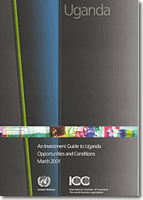
Uganda´s political and economic development in the past 17 years has been extraordinary. The country has recovered from the ruinous regimes of Idi Amin and Milton Obote to become one of the most dynamic economies in sub-Saharan Africa. It is rich in natural resources and offers a wide range of investment opportunities in mining (cobalt and limestone), agriculture (coffee, tea and fruit) and fishing. Linked to almost all of the primary-sector industries are opportunities in up-stream or down-stream manufacturing activities. In addition, the extensive privatization programme has opened up areas formerly closed to the private sector. Uganda was one of the first African countries to liberalize its telecom industry and there are now several private companies in operation.
Perhaps the biggest long-term opportunities are to be found in the tourism sector. Uganda, labelled the ´Pearl of Africa´ by former British Prime Minister Winston Churchill, offers a number of unique attractions, including Lake Victoria (the source of the Nile), the Murchison Falls and the Mountains of the Moon, along with a number of national parks and wildlife reserves hosting, among other fauna, half the world´s mountain gorilla population.
On the downside, the condition of much of Uganda´s infrastructure is poor. Decades of negligence and even deliberate destruction have left much of it in disarray. The intermittent and expensive power supply continues to be a problem. Although the workforce is generally well-educated, there is a considerable shortage of mid-level managers and technicians.
Despite this, with its dynamism and its track record of stability, Uganda is now a land of opportunities and challenges that investors ignore to their own loss. Its membership of the recently founded East African Community (EAC), with its 93 million consumers, is yet another reason to expect bright prospects for Uganda. Investors can expect further integration of the EAC, which established a Customs Union in January 2005 and is expected to form a political federation by 2013.
| ||



